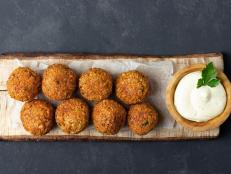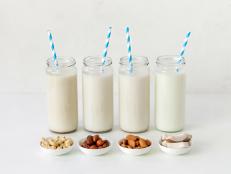How to Spot All the Bad Nutrition Advice on Social Media
Social media is filled with bad nutrition information, and yet so many of us turn to it for advice anyway.

Moyo Studio
Since Instagram launched 10 years ago, Social Media Influencer has become a legitimate (and often well-paid) job. Between influencers selling detox teas on Instagram and teenagers swapping diet tips on TikTok, social media has become the wild west of nutrition information.
And while there are countless niches out there, many influencers build their personal brands around wellness — health, fitness, nutrition, or some combination of all three. You could make the argument that many of them are popular because they fit a certain mold: young, thin, attractive, wealthy, and typically white. But that doesn’t quite capture the nuances of why people seem so eager to listen to their health advice, and why influencers without legitimate health credentials often seem to be far more successful at influencing than the actual experts.
Before you dive headfirst into the elimination diet that your favorite health coach is promoting or spend $100 on supplements that will supposedly cure everything that ails you, it’s worth stopping to think about why you’re so quick to believe in these things. What is it about wellness influencers on social media that’s so compelling? How do you know if what they’re saying is true? And, what can you do to make sure you’re getting the best possible information?
An anti-establishment attitude combined with an “I’m just like you” vibe actually makes influencers seem more trustworthy, not less.
Emily Hund, a research fellow at the University of Pennsylvania’s Annenberg School for Communication who studies social media influencers, says that these (largely unqualified) influencers are seen as credible for a few reasons: “First, they often identify themselves as a little bit outside the mainstream in some way,” she says. Maybe it’s by cultivating the narrative that they took a road less traveled and came out better for it. Or, Hund says, sometimes they do it in more extreme ways, by rejecting mainstream knowledge and contradicting the established norms in whatever subject they talk most about. (Think: An influencer who preaches constantly about the keto diet and often criticizes established nutrition recommendations.) On the other hand, most credentialed experts — registered dietitians, physicians, trained nutrition scientists, etc — aren’t so anti-establishment, because they are the establishment.
Second, influencers are constantly connecting with their followers on multiple levels. “The uptake in Instagram Stories in the last few years has been pretty monumental,” Hund says. “It provides a constant stream of content for followers to engage with, and the way influencers use it—usually appearing less polished than they do on their main feeds, speaking in a more casual way—really bolsters the idea that influencers are accessible, just like us.” Although some experts have started to use Instagram Stories (and social media in general) to create this same informal bond with their audiences, many have not.
For influencers, this perception of accessibility, combined with the idea that influencers are free-thinkers who are willing to step outside the box, actually adds up to “a really potent version of authenticity and credibility,” Hund says, adding that marketing firms consistently find through surveys that followers think of influencers as trustworthy, and that the majority of followers do ultimately take some kind of action (like buying a product or starting a diet) based on influencers’ content.
Many of these influencers are spreading half-baked nutrition information, which isn’t exactly their fault.
Before we get into how and why nutrition influencers spread information that’s not exactly evidence-based, let’s talk a bit about nutrition science. Basically, it’s a relatively new field — macronutrients (protein, carbs, and fat) were discovered in the mid 1800s, and the first vitamin wasn’t identified until 1926. In these early years, people thought of nutrition only in the sense of preventing deficiencies. In the 1950s, scientists started paying more attention to the effect of food on disease. And it wasn’t until the 1990s that we really started debating things like low-carb versus low-fat.
All of this to say: Part of the reason nutrition influencers seem to get away with spreading advice that’s not based in science is because the science itself is still pretty inconclusive. Yes, the Dietary Guidelines for Americans (DGAs) are based on mounds of evidence, but some of that evidence is fairly weak, which means that even nutrition experts argue about which foods and diets are best for various types of people. While this ongoing debate is an important part of the scientific process, it also sows doubt among experts and the general public, and gives an opening to nutrition influencers who seem so sure of their own advice.
Don’t assume something is legitimate just because everyone is promoting it.
Amanda Hamel, RD, is a dietitian who works as a social media strategist and virtual assistant for other dietitians. She points out that the nutrition advice influencers give is shaped by what their followers want to hear. “It’s a cycle of feeding the algorithm — give people what they want, keep producing what people want,” she says. So, a scientifically questionable diet like the Whole30 might become popular among influencers not because it works or because there’s lots of evidence to back it up, but because talking about it gets lots of engagement. Something like “lettuce tea” — lettuce steeped in hot water which, according to TikTok, can help you sleep — goes viral not because there’s any scientific backing, but because it’s so out-there that it’s shareable.
Influencers also tend to use themselves as evidence. If it works for them, they sell it to you. (Or if they’re getting paid to sell it to you, they tell you that it works for them.) And because you may trust them more than you trust nutrition science, you might do what they tell you to do. But while trying a new diet or supplement might seem like a harmless experiment, know that these things can hurt you. Supplements aren’t regulated by the Food and Drug Administration (FDA), which means there’s no way to know what’s really in them without third-party testing. And diets can cause unhealthy cycles of weight loss and weight gain, preoccupation with food, lowered self-esteem, increased risk of eating disorders, and more.
How to Sort the Good Advice from the Bad
The most ironclad way to sidestep bad nutrition advice on social media would be to avoid it altogether. But for most of us, that’s not realistic.
First, Check an Influencer’s Credentials.
Before you decide to follow a wellness influencer, Hund says it’s important to check their qualifications. Someone giving nutrition advice should most often be a registered dietitian (RD), a certified nutrition expert with an advanced nutrition degree and standardized clinical training. Other experts might have an advanced degree in nutrition (MS, MPH, or Phd) and work at a university, research center, or health department; a physician (MD or DO) might also give basic nutrition advice.
Hund adds that it might not be enough to just look for that credential in their social media bio. Google them to find out more about what they do and where they work. Unfortunately, there’s no way to verify online whether or not someone is an RD, but you can verify MD and DO credentials by searching a doctor’s name in the Federation of State Medical Boards’ database. You don’t need to unfollow every influencer without a credential, but always be aware that while doctors and dietitians are trained and regulated — they have to abide by certain rules and standards or risk losing their license and/or credential — influencers often don’t have any formal education, and can say and do whatever they want.
Ignore advice that’s sponsored.
According to Federal Trade Commission (FTC) guidelines, someone who’s being paid to promote a product must disclose this. In other words, someone can’t just recommend a smoothie company to you without telling you that they’re getting $10,000 to do so.
If a post is sponsored, it will be clearly marked with words like “sponsored,” “paid partnership,” “presented by,” or “promoted by.” When it comes to nutrition advice, it’s best ignore these posts. People are far more likely to recommend something if they’re being paid to do so, even if they believe it’s only because they truly like the product. And yes, this absolutely applies to health-related products. A ProPublica analysis found that doctors who received money related to a specific drug (for giving talks, consulting, and receiving free meals and travel from the drug company) wrote 58% more prescriptions for those drugs than other doctors. You can bet that nutrition advice follows this same pattern.
Be wary of the algorithm.
As you surely know, “an algorithm determines what content you see when you open the [Instagram] app,” Hamel says. She explains that posts get boosted to the top of your feed based primarily on how much engagement (likes and comments) they’re getting from others, and how similar they are to other posts you like and engage with. But again, just because a post is popular doesn’t mean the advice it gives is legitimate. It tends to be the most exciting or controversial bits of advice that rise to the top.
Worse, the algorithm is about to wreak even more havoc on the types of information you see. “Coming soon, your home feed will include recommended content from accounts you don’t follow,” Hamel says, again based on the types of posts and accounts you engage with. (TikTok already does this with the “For You” feed.) She and other health professionals are worried about the effects this will have. What if you’ve spent time curating a feed filled with respected nutrition experts who talk about things that interest you? Now, it seems, your feed might fill up with “similar” posts that give terrible advice.
No matter whose advice you’re taking on social media, it’s always best to run it by a provider who actually knows you.
The bottom line here is that while social media can be a good place to learn about new ideas and connect with people who have similar interests, it’s really not a good place for health advice. Hund points out that influencers — even if they’re credentialed — usually stand to gain from you taking their advice, whether they’ll get commission from a product you buy, or money for providing you a service.
If you’re thinking about making a change in how you eat based on what you see on social media, you should talk about it first with your doctor or a registered dietitian. Even objectively good advice might not be the right advice for you, depending on various factors. In an individual setting, a provider can answer any questions you have, and make suggestions based on your unique needs, not some algorithm.
Christine Byrne, MPH, RD, is a registered dietitian and owner of Christine Byrne Nutrition, a virtual private practice specializing in eating disorders, disordered eating, and orthorexia. She takes a weight-inclusive, gender-affirming, non-diet approach. As a nutrition journalist, she has contributed to dozens of national media outlets.
Related Links:

































